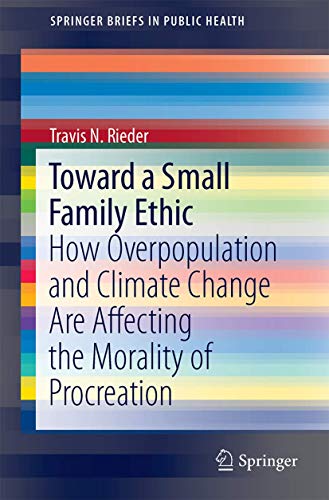Toward a Small Family Ethic
How Overpopulation and Climate Change Are Affecting the Morality of Procreation (SpringerBriefs in Public Health)
Travis N. Rieder
BOOK REVIEW

The urgency of our current global crisis weighs heavily upon us, with overpopulation and climate change looming as the twin specters of our age. In this tumultuous landscape, Travis N. Rieder's Toward a Small Family Ethic emerges not merely as a book but as a clarion call to the moral conscience of humanity. Rieder dares to explore a question that many accept as taboo: Is it ethical to bring new life into a world that teeters on the brink of ecological catastrophe?
Rieder compels us to confront the complexities surrounding procreation-an act often viewed through the rose-tinted glasses of joy without acknowledging the burdens it can impose on our planet. Every new child contributes to burgeoning populations and the consequent strain on resources. Is it selfish to have children, knowing that our decisions could exacerbate environmental degradation? Rieder's prose is both razor-sharp and compassionate, urging us to reflect on this moral dilemma with unflinching honesty. He invites you to grapple with the implications of your family planning choices in light of the collapse that seems ever more palpable.
The moral fabric of procreation is often woven with threads of personal desire and societal expectations, yet Rieder bravely unwinds this tapestry. He posits that the small family ethic-advocating for fewer children-could be a radical act of stewardship, a means of combating climate change and overpopulation. With a deft hand, the author opens a dialogue that transcends simplistic arguments about freedom and choice, delving into a collective responsibility that binds us all.
The reactions to Rieder's work are as varied as the readers themselves. Some herald it as an eye-opener, revolutionary in its insistence that ethical clarity can guide familial decisions in a changing world. Others resist the notion, perceiving it as an unwelcome intrusion into the deeply personal sphere of family planning. The controversy surrounding such powerful ideas is palpable; some readers find themselves defensive, while others are inspired to reevaluate their views on parenthood and sustainability.
Rieder does not shy away from probing the emotional cores of his readers. He taps into our innate desires for connection, legacy, and love while juxtaposing them against the harsh realities of our environmental realities. Those who argue against the pursuit of small family ethics often cite the joys of raising children, the delight in family connections, and the beauty of life. But what if those joys come at an insurmountable cost to future generations? This isn't just a philosophical exercise; it's a stark moral reality that requires your attention-a truth that might just keep you awake at night, wrestling with the weight of your choices.
Readers who feel the sting of discomfort might discover that Rieder's exploration doesn't crush hope but instead presents a path toward creating a more sustainable future. His arguments aren't intended to shame but to provoke thoughtful dialogue. He asks you-yes, you-what legacy you wish to leave behind and challenges you to consider how to reconcile personal aspirations with your responsibilities towards the planet.
In many ways, Toward a Small Family Ethic is not just about reducing family size but embracing a broader ethical stance towards existence itself. This book doesn't hand you answers wrapped up in neat packages; it forces you to wrestle with complex emotions and moral questions that lie beneath the surface.
As you close the pages of this concise yet profound work, prepare for a transformation of thought. Rieder's insights might just inspire you to engage with the world differently-not just as a participant in the act of procreation, but as a custodian of the Earth. The stakes have never been higher, and the conversation has only just begun. 🌍✨️
📖 Toward a Small Family Ethic: How Overpopulation and Climate Change Are Affecting the Morality of Procreation (SpringerBriefs in Public Health)
✍ by Travis N. Rieder
🧾 78 pages
2016
#toward #small #family #ethic #overpopulation #climate #change #affecting #morality #procreation #springerbriefs #public #health #travis #rieder #TravisNRieder